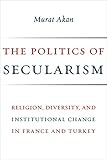The Politics of Secularism : Religion, Diversity, and Institutional Change in France and Turkey / Murat Akan.
Material type: TextSeries: Religion, Culture, and Public Life ; 41Publisher: New York, NY : Columbia University Press, [2018]Copyright date: ©2017Description: 1 online resourceContent type:
TextSeries: Religion, Culture, and Public Life ; 41Publisher: New York, NY : Columbia University Press, [2018]Copyright date: ©2017Description: 1 online resourceContent type: - 9780231181808
- 9780231543804
- BL2765.F8 A58 2017
- online - DeGruyter
- Issued also in print.
| Item type | Current library | Call number | URL | Status | Notes | Barcode | |
|---|---|---|---|---|---|---|---|
 eBook
eBook
|
Biblioteca "Angelicum" Pont. Univ. S.Tommaso d'Aquino Nuvola online | online - DeGruyter (Browse shelf(Opens below)) | Online access | Not for loan (Accesso limitato) | Accesso per gli utenti autorizzati / Access for authorized users | (dgr)9780231543804 |
Frontmatter -- Contents -- Preface -- CHAPTER I. Traveling Through Analytical and Hermeneutical Approaches -- CHAPTER II. Accounting for Institutional Outcomes and Trajectories -- CHAPTER III. The Institutional Politics of Laïcité in the French Third Republic -- CHAPTER IV. The Politics of Laïcité Positive and Diversity in Contemporary France -- CHAPTER V. The Institutional Politics of Laiklik in Kemalist Turkey -- CHAPTER VI. The Sincere Government (Samimi Hükümet), the Institutional Politics of Religion, and Diversity in Contemporary Turkey -- Conclusion -- Notes -- Bibliography -- Index
restricted access online access with authorization star
http://purl.org/coar/access_right/c_16ec
Discussions of modernity-or alternative and multiple modernities-often hinge on the question of secularism, especially how it travels outside its original European context. Too often, attempts to answer this question either imagine a universal model derived from the history of Western Europe, which neglects the experience of much of the world, or emphasize a local, non-European context that limits the potential for comparison. In The Politics of Secularism, Murat Akan reframes the question of secularism, exploring its presence both outside and inside Europe and offering a rich empirical account of how it moves across borders and through time.Akan uses France and Turkey to analyze political actors' comparative discussions of secularism, struggles for power, and historical contextual constraints at potential moments of institutional change. France and Turkey are critical sites of secularism: France exemplifies European political modernity, and Turkey has long been the model of secularism in a Muslim-majority country. Akan analyzes prominent debates in both countries on topics such as the visibility of the headscarf and other religious symbols, religion courses in the public school curriculum, and state salaries for clerics and imams. Akan lays out the institutional struggles between three distinct political currents-anti-clericalism, liberalism, and what he terms state-civil religionism-detailing the nuances of how political movements articulate the boundary between the secular and the religious. Disputing the prevalent idea that diversity is a new challenge to secularism and focusing on comparison itself as part of the politics of secularism, this book makes a major contribution to understanding secular politics and its limits.
Issued also in print.
Mode of access: Internet via World Wide Web.
In English.
Description based on online resource; title from PDF title page (publisher's Web site, viewed 02. Mrz 2022)


